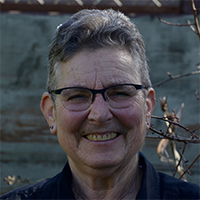 Daily Life in Gaza
Daily Life in Gaza
Only makeshift tents
and broken pieces
of ground to rest
upon.
No tombstones.
When the rains continue
all winter and then stop,
sewers still spill over
coughing children,
who can only mimic
play try to sell homemade
foods for pocket change.
All land crossings
closed border gates
never entered—
not through
not fleeing not out of—
Whose bones
appear only
as breath?
What can we say
to soldiers who give
a thumbs up
as they detonate explosives
and crushed cement pours out
of every shattered
window?
entire blocks of buildings
crumpled
cities
unrecognizable
no stones to talk
to as though stones have
memory.
Will we
remember
the children?
Maybe we will if we have not
become
too busy
eating or drinking
or simply sleeping.
How could we explain
a photograph
of gay Israeli soldiers
raising a pride flag
in the rubble
they've made?
There is no daily life
when soldiers point
guns doom
Palestinians to rows
of people on their knees inside
barbed wire fences.
When a poet
is finally allowed to pass through
the Rafah crossing
he writes to us how the soldiers
stripped him and thousands of Palestinians down
to their skeletal
shapes.
We did not call them
hostages.
Months later someone might find
the article this poet
has written
in a recycling bin
in an office
in the United States.
Media photos
of bodies
huddled together—
forming a mottled image
continue to follow us
until our deaths.
Palestinian poets continue
to insist
that we recall,
not just their sorrow,
but the solemn
resistance
to love
their land
beyond
these hours.








